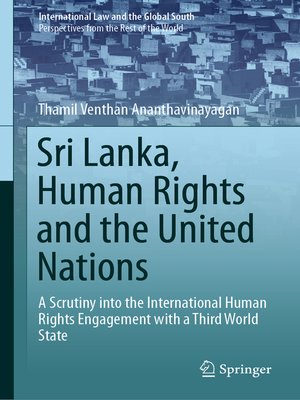Sri Lanka, Human Rights and the United Nations
ebook ∣ A Scrutiny into the International Human Rights Engagement with a Third World State · International Law and the Global South
By Thamil Venthan Ananthavinayagan

Sign up to save your library
With an OverDrive account, you can save your favorite libraries for at-a-glance information about availability. Find out more about OverDrive accounts.
Find this title in Libby, the library reading app by OverDrive.



Search for a digital library with this title
Title found at these libraries:
| Library Name | Distance |
|---|---|
| Loading... |
This book examines the engagement between the United Nations' human rights machinery and the respective governments since Sri Lanka (then Ceylon) joined the United Nations.
Sri Lanka has a long and rich history of engagement with international human rights instruments. However, despite its active membership in the UN, the country's post-colonial trials and tribulations are emblematic of the limited influence the international organisation has exerted on this country in the Global South.
Assessing the impact of this international engagement on the country's human rights infrastructure and situation, the book outlines Sri Lanka's colonial and post-colonial development. It then considers the development of a domestic human rights infrastructure in the country. It also examines and analyzes Sri Lanka's engagement with the UN's treaty-based and charter-based human rights bodies, before offering conclusions concerning the impact of saidengagement.
The book offers an innovative approach to gauging the impact of international human rights engagement, while also taking into account the colonial and post-colonial imperatives that have partly dictated governmental behaviour. By doing so, the book seeks to combine and analyse international human rights law, post-colonial critique, studies on biopower, and critical approaches to international law. It will be a useful resource not only for scholars of international law, but also for practitioners and activists working in this area.
Sri Lanka has a long and rich history of engagement with international human rights instruments. However, despite its active membership in the UN, the country's post-colonial trials and tribulations are emblematic of the limited influence the international organisation has exerted on this country in the Global South.
Assessing the impact of this international engagement on the country's human rights infrastructure and situation, the book outlines Sri Lanka's colonial and post-colonial development. It then considers the development of a domestic human rights infrastructure in the country. It also examines and analyzes Sri Lanka's engagement with the UN's treaty-based and charter-based human rights bodies, before offering conclusions concerning the impact of saidengagement.
The book offers an innovative approach to gauging the impact of international human rights engagement, while also taking into account the colonial and post-colonial imperatives that have partly dictated governmental behaviour. By doing so, the book seeks to combine and analyse international human rights law, post-colonial critique, studies on biopower, and critical approaches to international law. It will be a useful resource not only for scholars of international law, but also for practitioners and activists working in this area.







